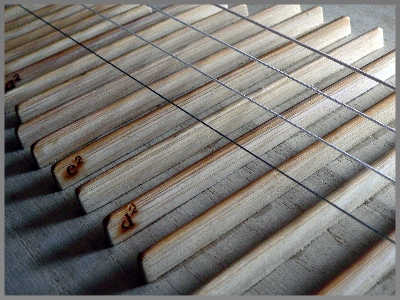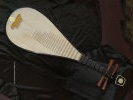Preface
Articles
>Instruments<
Musicians
Books + CDs
Links
_______________________

|
Instruments
The Pipa
The
lute
discovered on the next pages historically was three basic ideas of the
same lute converging into the actual Pipa. The first lutes like this
were mentioned in the second century BC. It knew four strings and not
so many frets like today.

|
After
a
common agreement by the artists, the
four strings are nowadays tuned:
A-D-E-A.
This tuning is sometimes struck through, accompanying the melodies
played on the highest chord.
The Pipa is not hold horizontally like a guitar but vertically, with
the chords showing away from the belly. Compared to the guitar, the
Pipa has no sound hole and is made of one piece of wood with only small
resonance, thus sounding like a Banjo.
The right hand plucks the chords with finger plecs, while the left hand
pitches and modulates the tone in between the 24 playing frets (of
which the upper ones, called xiang,
are black painted pyramid cuts inside the neck), thus giving the Pipa a
range of four octaves.
Today, Pipa artists are well known
for their virtuos
playing skills, and a wide variety of literature. and its deep link
back into the classical and ancient music of China. |
If you are
interested in playing
tips and further informations about
the classical Pipa music, please read my article:
"Playing the Pipa"
Pictures (Click to expand):
   <- Back to the overview
<- Back to the overview
|






